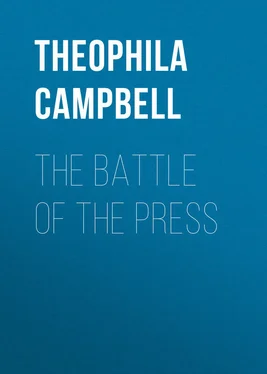Theophila Campbell - The Battle of The Press
Здесь есть возможность читать онлайн «Theophila Campbell - The Battle of The Press» — ознакомительный отрывок электронной книги совершенно бесплатно, а после прочтения отрывка купить полную версию. В некоторых случаях можно слушать аудио, скачать через торрент в формате fb2 и присутствует краткое содержание. ISBN: , Жанр: foreign_antique, foreign_prose, Историческая проза, на английском языке. Описание произведения, (предисловие) а так же отзывы посетителей доступны на портале библиотеки ЛибКат.
- Название:The Battle of The Press
- Автор:
- Жанр:
- Год:неизвестен
- ISBN:http://www.gutenberg.org/ebooks/38370
- Рейтинг книги:4 / 5. Голосов: 1
-
Избранное:Добавить в избранное
- Отзывы:
-
Ваша оценка:
- 80
- 1
- 2
- 3
- 4
- 5
The Battle of The Press: краткое содержание, описание и аннотация
Предлагаем к чтению аннотацию, описание, краткое содержание или предисловие (зависит от того, что написал сам автор книги «The Battle of The Press»). Если вы не нашли необходимую информацию о книге — напишите в комментариях, мы постараемся отыскать её.
The Battle of The Press — читать онлайн ознакомительный отрывок
Ниже представлен текст книги, разбитый по страницам. Система сохранения места последней прочитанной страницы, позволяет с удобством читать онлайн бесплатно книгу «The Battle of The Press», без необходимости каждый раз заново искать на чём Вы остановились. Поставьте закладку, и сможете в любой момент перейти на страницу, на которой закончили чтение.
Интервал:
Закладка:
"Letters from St. Petersburg to the 30th of November state that the Emperor Alexander of Russia, apprehensive that the morals of his people would be injured by their reading the account of Carlile's Trials, had given directions to the police to prevent the introduction of all the English newspapers containing it." — London Times , Dec. 29th, 1819.
As a straw shows the way the wind blows, so this little report shows the apprehension of crowned heads that some one or more of their subjects might see something to admire and follow in Carlile's example. Else why such measures?
CHAPTER VI. TAKEN TO PRISON
Carlile was sentenced to three years' imprisonment and a fine of £1,500. Almost as soon as the sentence was passed, Carlile was handcuffed and taken in the dead of night to Dorchester Gaol, some 130 miles from London. He was not allowed to see his wife or children, nor to communicate with his friends. As soon as they had him safely locked up, the authorities made a descent upon the Fleet Street shop, seized upon the entire stock and furniture, and closed it from business. This seizure was made ostensibly to secure the fines, but really to cripple Carlile so that he could never pay them, and thus they could keep him in perpetual imprisonment. For if he had been allowed to retain his stock and profitable business, he could have paid his fine of £1,500 ($7,500) before his term of imprisonment expired; but the plan was to cripple him past recovery. The goods seized were mostly books and pamphlets, which would have brought him £2,000 ($10,000) in the ordinary way of sale. This confiscation was no part of his sentence, be it remembered, but an afterthought, and was performed by the power of might over right. This stock was thrown into a damp cellar or warehouse, and practically ruined. His wife and children would have been rendered helpless and impoverished had not Carlile cautioned his wife some time before to prepare for the worst, and to reserve a portion of the money resulting from the large sales during the trials for herself and children. They would have been reduced to actual want, for the officers even took the money found in the money-drawer, although not one dollar resulting from this seizure was ever allowed in mitigation of his fines. The most trying part of the sentence to Carlile was that he was only allowed to take exercise in the open air for half an hour each day, or one hour every other day, at the discretion of the jailer; and even for this half-hour he was to be taken out by the jailer as an animal might be led out at a show for outsiders to gaze at. This was too much for the spirit of Carlile to endure; he absolutely refused to leave his room in any such a manner, and as a consequence remained in his room for two years and a half without ever leaving it, rather than submit to such an insult. This will give the reader an idea of the indomitable spirit of the man. After this length of time he succeeded in getting this part of the sentence set aside, and he was allowed to walk out into the prison enclosure at his pleasure and very much to the improvement of his health. About a year after his incarceration, on reading of the treatment of Henry Hunt in Ilchester Gaol, he writes: —
"I have seen enough of gaols to be fully alive to the painful situation of Mr. Hunt, and since I have read of his present restrictions, I begin to feel myself in a palace, instead of a prison, or Bastille, as I occasionally call it. I am the better pleased with my treatment at this moment, as yesterday I was allowed to see a friend in my room for the first time, and I may add that now my sisters and my wife and children are allowed to visit me during the hours of nine to four each day. My room is large, light and airy, and far excels the state rooms of the King's Bench Prison. I have a sink and water-pipe and complete water-closet attached to the room, so that having provided myself with the necessary apparatus for both hot and cold baths, I have the enjoyment, nay, the luxury of these at pleasure; but when I mention my room and my baths, I can go no further, for the way in which I am locked up seems to me to be ridiculous, and I have had the honor to be a prisoner in the King's Bench Prison, in Newgate, in Giltspur Street Compter, and in the houses of the sheriffs officers (not for debt, but for libel). On entering the prison I told the keeper that as far as money would go to make me comfortable I would spend, but I was immediately informed that all money would do for me was to obtain me a good dinner from , not at the Governor's table. I viewed this as a secondary object, as I was ever careless about my food so that it was wholesome and sufficient. I also learned that all the fear was that of my corrupting the inmates of this most respectable place. I resolved then to economise and to teach temperance by example, and this I have done to their surprise, for I have shown them that a man with a contented mind and no labor, has need of but a small quantity of food to keep fat and in good health. Such has been the solitude of my confinement in this prison, and so little conversation have I had, that, on attempting to speak, I have in a manner found my voice gone, and have been obliged to make a great effort to be heard. I have a couch which forms a sofa-chair, and on which I consider that I lie sleeping, reading or thinking on an average sixteen hours a day, and I walk about the room or sit in a chair as a relief, excepting the few hours I spend at the writing desk. I am sensible that this is a bad habit, but I have no alternative. As my situation is at present I am quite comfortable, and I attribute the closeness of my confinement to the pretended horror which clerical and fanatical magistrates profess to feel at what they call sedition and blasphemy."
To add to the sorrows of this time came the news of the death of his mother. Carlile had always been a most loving and dutiful son, and he was deeply grieved. He realised fully that her death had been hastened if not caused by his present situation, and in the following letter one can trace the deep concern and regret which he felt. "The bravest are the tenderest. The loving are the daring."
"Dorchester Gaol, March 27th, 1820.
"Mr. A. Morrison,
"Dear Sir, – Soon after I received your parcel, and before I had determined how or when I should convey an answer to you, the post brought me the painful intelligence of the death of my mother. I was in a measure prepared for it, as I felt certain her vital energies were quite exhausted. On perceiving the letter sealed with black I threw it aside, and for four hours could not summon resolution enough to open it. But that painful moment has passed, and I shall only look back to express my gratitude to you and to Mrs. Morrison for the well-timed relief and consolation my mother has received at your hands since my confinement. I had hoped that her life might have extended a few years, that she might have witnessed the result of my present career, as I fear that as far as it has gone it has given her nothing but pain. I feel it to be a duty I owe you to thus publicly, as I have the means, to say that it is my firm belief that my mother would not have survived the first shock of my sentence and its consequence had you not poured the balm of consolation into her bosom. She could see no other source of dependence than myself, and I do not think she would have survived the first few hours that were necessary to convince her that all was not lost. Your kindness to me was more than friendship; you were not of the many hundreds who came to me in my prosperity to shake hands, to hold out specious promises, that I might command your services if ever I had need of them. You, of all my professed friends, you alone held out your hand to me when in prison, where our first interview took place. When I fell among thieves you were the good Samaritan. As my prospects began to look more cheerful, I had hoped that my mother would have lived a few years longer, that she might have felt the pleasure of that filial affection I have always felt disposed to extend to her both as my duty and my pride whenever I have had the means. It gives me pleasure to know that she fell calmly asleep, untortured by priests or superstitious notions. I consider it a duty not to look back except for gratitude or experience, and in doing this I feel that I am rivetted in my esteem of your friendship, and while we live I shall consider myself your debtor.
Читать дальшеИнтервал:
Закладка:
Похожие книги на «The Battle of The Press»
Представляем Вашему вниманию похожие книги на «The Battle of The Press» списком для выбора. Мы отобрали схожую по названию и смыслу литературу в надежде предоставить читателям больше вариантов отыскать новые, интересные, ещё непрочитанные произведения.
Обсуждение, отзывы о книге «The Battle of The Press» и просто собственные мнения читателей. Оставьте ваши комментарии, напишите, что Вы думаете о произведении, его смысле или главных героях. Укажите что конкретно понравилось, а что нет, и почему Вы так считаете.












